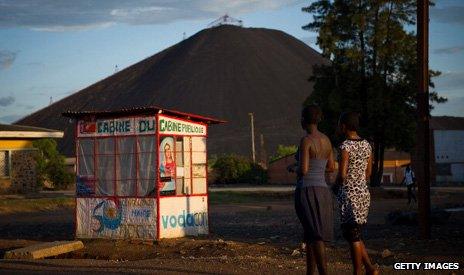Remote parts of Congo may soon get mobile coverage
- Published

In many areas of Congo, there is limited mobile phone coverage
Remote rural communities of Congo may soon have mobile coverage, thanks to an international collaboration.
Pan-African telecom provider RascomStar-QAF, Viasat and UK-based ip.access plan to use <link> <caption>small cells called picocells</caption> <url href="http://www.ipaccess.com/en/picocells-introduction" platform="highweb"/> </link> to ensure coverage even in the Congo's rainforest.
Femtocells are usually used to deliver a private signal in your home if it is outside the coverage area.
The aim is to install 50 such mini base stations around Congo this summer.
RascomStar, the company that operates Rascom-QAF1, the first satellite entirely dedicated to Africa, said it aims to expand the pilot into a larger-scale commercial launch in 2013, extending it to at least 10 other African countries.
"Our services were developed to provide affordable universal access telephony in rural and remote areas… together with our partners, we believe that we have designed a service that meets the needs of a region underserved by mobile and indeed fixed telephony," Faraj Elamari, head of RascomStar-QAF, said in a statement.

A picocell creates a private wireless network
Lack of towers
When the satellite was launched in 2010, one of the goals was to provide the African continent with mobile network coverage.
But in many remote and rural parts, people are still unable to use mobile phones simply because of the lack of necessary infrastructure.
Since mobile communications rely on airwaves to work, once transmissions hit a telecommunications tower, it is up to the wireless networks in the area to ensure coverage.
But in Africa's remote corners, there are simply not enough of these towers - and to solve the issue, the RascomStar-QAF turned to international collaboration.
A UK company called ip.access agreed to supply picocells - small access nodes - around Congo, with one gateway in the capital, Brazzaville.
Each cell will then create a private wireless network in a particular area.
A femtocell is easy to use - and the company says that it could be put up by someone with basic technical knowledge.
This way, the pico solution would be much simpler and cheaper than having to build new towers and expensive base stations.
"Working closely with our partners we have helped to create an end-to-end system by using our expertise in small cell deployments to bring voice and internet access to previously unconnected parts of the world at a price-point they can afford," said Simon Brown, chief executive of ip.access.
"It's a great project to be part of and we look forward to its expansion into other African countries."
- Published9 November 2011
- Published16 June 2011
- Published22 November 2010
- Published29 September 2011